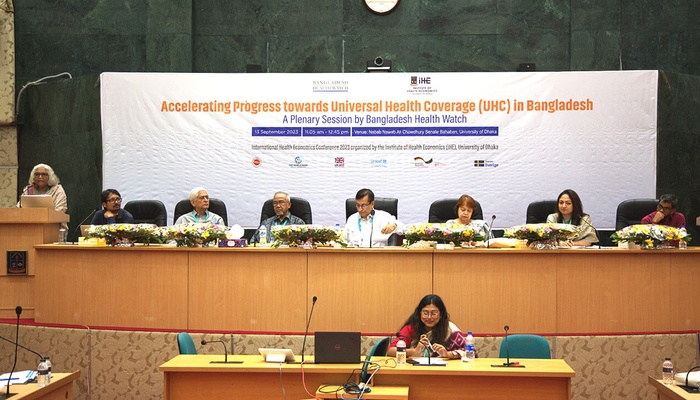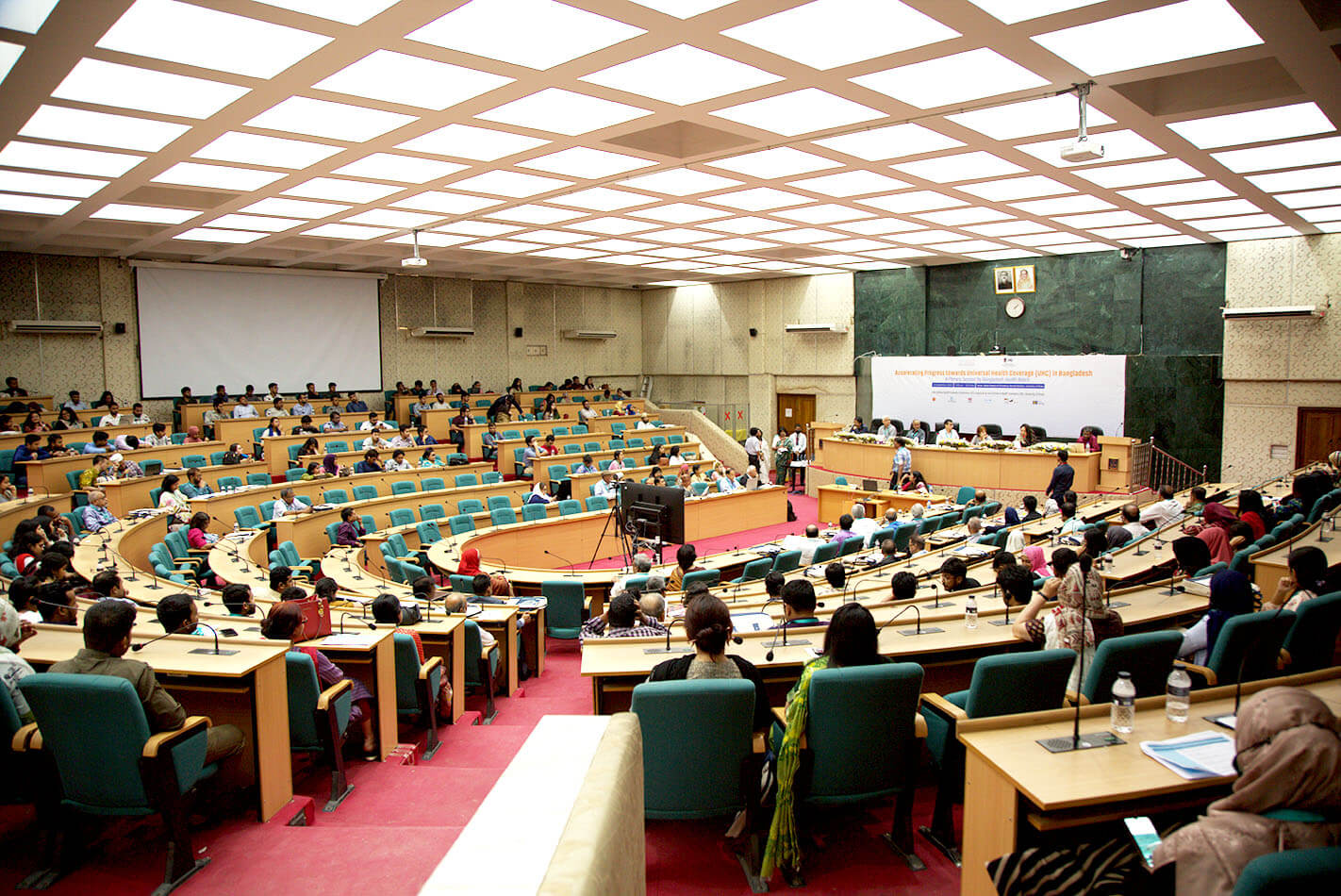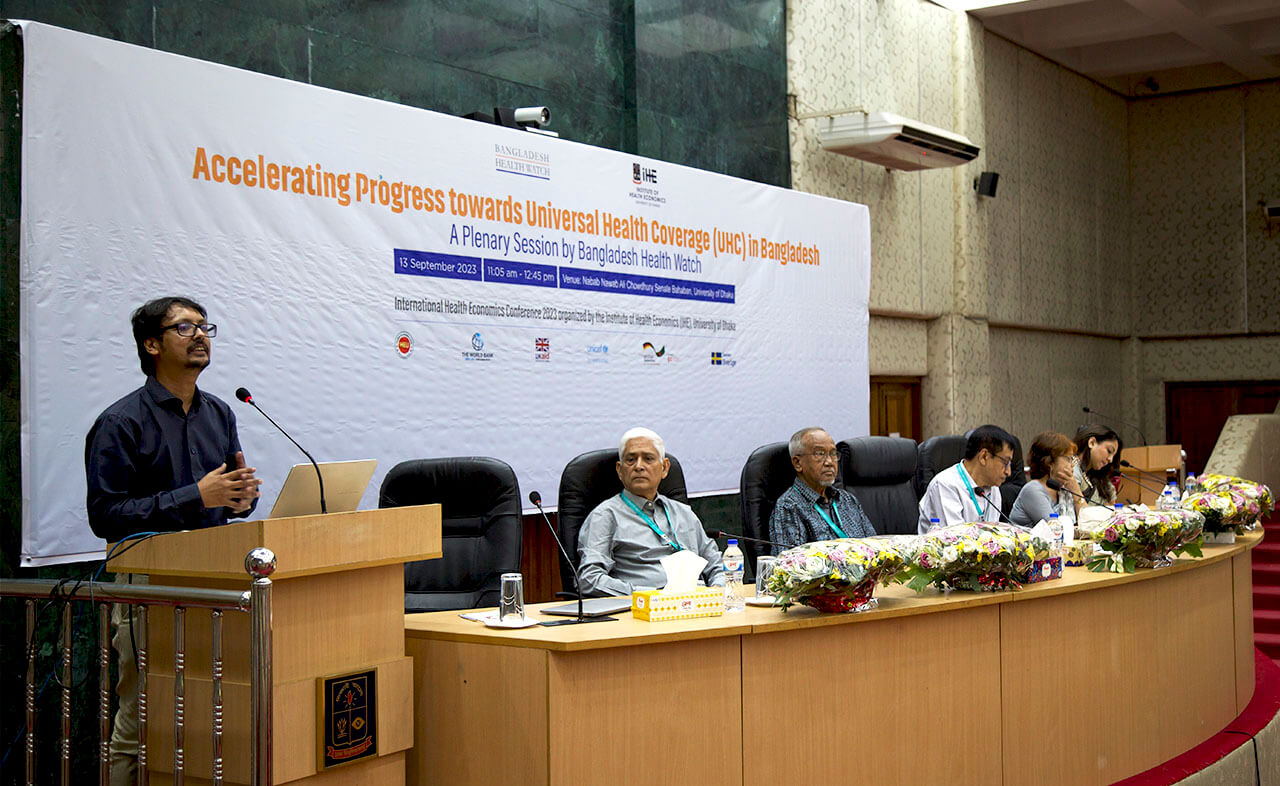

Universal Health Coverage (UHC) is a comprehensive healthcare system concept aimed at ensuring that all individuals and communities have access to a full range of quality healthcare services without facing financial hardship. Achieving UHC is a multifaceted endeavor due to various complex factors, including tailoring it to the specific needs of each nation, providing comprehensive healthcare services, allocating resources effectively, promoting equity, garnering political commitment, and engaging communities. However, despite the presence of established roadmaps, progress towards achieving Bangladesh’s UHC targets as defined in SDG Targets 3.8.1 and 3.8.2 appears to be uneven. In response, Bangladesh Health Watch has launched a citizen-driven initiative aimed at evaluating the current situation and recommending strategies to accelerate progress towards fulfilling the SDG targets.
To discuss the current situation and outline strategies for expediting progress towards the Sustainable Development Goal (SDG) Universal Health Coverage (UHC) targets, Bangladesh Health Watch hosted a plenary session titled “Accelerating Progress towards Universal Health Coverage (UHC) in Bangladesh” on September 13, 2023, from 11:05 am to 12:45 pm. This session was part of an international health economics conference themed “Progress towards Universal Health Coverage,” which took place on September 12 and 13, 2023, organized by the Institute of Health Economics (IHE), University of Dhaka. The event was held at the Nabab Nawab Ali Chowdhury Senate Bhaban Auditorium (2nd floor), University of Dhaka, Bangladesh.

On that occasion, Mr. Md. Humayun Kabir (Team Leader, Preparation of PIP for HPNSP of MOHFW) was present as the chairperson of the session. Mr. M. M. Reza (Former Secretary for Health), Dr. Syed A Hamid (Professor, Institute of Health Economics, University of Dhaka), Barrister Rashna Imam (Advocate, Supreme Court of Bangladesh and Member, Advisory Group, BHW), and Dr. Rounaq Jahan (Convenor of the Advisory Group, BHW) were present as panel discussants.
In his welcome speech, Mr. Faruq Ahmed, acting convenor of Bangladesh Health Watch, expressed gratitude to the distinguished guests and participants for their attendance and provided an overview of the background and objectives of the plenary session.
A keynote presentation titled “Accelerating Progress towards Universal Health Coverage (UHC) in Bangladesh” was delivered jointly by Dr. Atonu Rabbani, Associate Professor, Department of Economics, University of Dhaka, and Dr. Suzana Karim, Assistant Professor, Institute of Health Economics, University of Dhaka.

During their presentation, Dr. Rabbani and Dr. Karim highlighted that despite notable improvements in the health sector over the past decade, Bangladesh continues to reach slightly more than half of the population with essential health services, measured by the UHC SCI, one of the lowest rates in South-East Asia. After the presentation, the guests gave their remarks.
M M Reza, former health secretary talked about strengthening PHC because without it UHC cannot be achieved. UHC should focus on the private sector since private sector engagement is very high in healthcare services. Dr Reza stressed upon other issues, he says, “We need to consider the health effect of climate change, environmental effect and medical waste management.”
Barrister Rashna Imam stressed on “Lack of accountability in medical sector”. She said that in our country medical negligence is not duly addressed’. She also said that, “How will accountability come if there is no law on medical negligence?” She also said that “Right to health is right to life. The state should be ensure proper no negligence in health.” She also said that, “Public interest litigation (PIL) can make a difference and that should be in more practice in our country. This will help to proceed towards UHC.”
Syed Abdul Hamid said, “We need to strengthen the existing health system, emphasising on the efficiency and utilising the existing resources in a proper way. If we can mitigate the small finance gaps then efficiency level might be increased and services will be smooth.” He also talked about raising patient’s voice because that will lead towards accountability and better health services.
Rawnaq Jahan talked about administrative anomalies prevailed in the system. Also the bureaucratic issues sometimes take things longer to implement.” She also said, “We need to identify the obstacles in this issue, because without if we can remove the obstacles then the path towards success will be achieved.”
The findings reveal that Bangladesh has improved its UHC Service Coverage Index (SCI) from a score of 45 in 2015 to 52 in 2021. However, this increase is considered insufficient and raises concerns about the country’s ability to reach the minimum UHC SCI target of 80 by 2030. Extrapolating the current rate of service coverage increase suggests that achieving an SCI of 80 by 2030 may not be feasible. Based on the most recent five years’ data (2015-2021), projections indicate that the SCI would only reach 61 by 2030, falling significantly short of the targeted goal. Furthermore, when assessing the 14 tracer indicators of UHC SCI, Bangladesh performs well in certain areas such as vaccinations, family planning, TB drug coverage, and health security. However, if current trends persist, it is unlikely to meet the UHC targets by 2030.
Some recommendation presented in the presentation was, a) establishment of a strong primary healthcare system, b) improved healthcare coordination, c) the prioritization of General Practitioners (GPs), d) the decentralization of healthcare to the district level. Additionally, comprehensive regulation of the private sector and empowering civil society organizations for transparency and accountability are crucial measures to enhance efficiency and equity within the healthcare system from civil society perspective.
Citizen's Voice